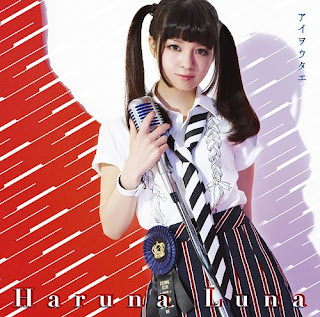Senki Zesshou Symphogear G OP
Space Battleship Yamato 2199 ED (Track no. 2)
Space Battleship Yamato 2199 ED (Track no. 2)
Tracklist:
1. Vitalization
2. Ai no Hoshi
3. Dramatic Love
1. Vitalization
Even after several attempts to write about it, Vitalization still manages to slip through with its overwhelming amount of epic, making it next to impossible to do justice to. A chopped-up pile of heavy synthage opens the track, exploding into a suddenly deep ambient and Nana's almost operatic vocals. Being even crazier than Synchrogazer, the complex arrangement utilizes every imaginable kind of techno and electronic samples, from 8-bit chips, over sub-woofers and extremely hard, strong dubstep sequences right before the salve of the insanely fast, seizure-inducing chorus. As not to forget the roots of her music, on the top of all the trancelike spins a single hypnotic violin is added as well, making another venture into techno-anison. In contrast, Nana's voice flawlessly slips from heavily layered tones to the impressive pureness similar even to one of Yuki Kajiura's vocalists. Summing up, the effectiveness of it might just be present there because it's all new and unique, but it will definitely be present in the legends as one of her best songs, and a masterpiece.
Even after several attempts to write about it, Vitalization still manages to slip through with its overwhelming amount of epic, making it next to impossible to do justice to. A chopped-up pile of heavy synthage opens the track, exploding into a suddenly deep ambient and Nana's almost operatic vocals. Being even crazier than Synchrogazer, the complex arrangement utilizes every imaginable kind of techno and electronic samples, from 8-bit chips, over sub-woofers and extremely hard, strong dubstep sequences right before the salve of the insanely fast, seizure-inducing chorus. As not to forget the roots of her music, on the top of all the trancelike spins a single hypnotic violin is added as well, making another venture into techno-anison. In contrast, Nana's voice flawlessly slips from heavily layered tones to the impressive pureness similar even to one of Yuki Kajiura's vocalists. Summing up, the effectiveness of it might just be present there because it's all new and unique, but it will definitely be present in the legends as one of her best songs, and a masterpiece.
Rating: 10
2. Ai no Hoshi
Suddenly, the atmosphere completely changes, with a silent piano slowly playing in the background accompanied by a touching violin. The dreamlike, soft scenery gains a bit of tempo afterwards, joined by drums and an acoustic guitar, and even a harp, but it still leaves the serene impression unimpaired. Accordingly, Nana's vocals have the main spotlight here, soaring up to heights and returning even deeper, all while following the moving melody and tear-jerking chord progressions which make this song so special. The fans are somewhat split on either Ai no Hoshi or Vitalization being the better song, but all I can say is that it's definitely up to the challenge of the famous tie-in it was given.
Rating: 10
Rating: 10
3. Dramatic Love
Closing the single, Dramatic Love is perhaps a bit of a load-off for Nana because of the lack of the overall seriousness and vocals stunts, being more like an upbeat, filtered version of DISCOTHEQUE mixed with the 80s catchy charm. For some reason, aside the uplifting and happy instrumentation, heavily techno-related elements from Vitalization appear occasionally, such as deep pulsations, slightly noticeable dubstep and such, which together with the piano and bells creates a quirky game-like feeling, especially in the middle eight section. There are some unusual harmonies present, but the song is very enjoyable and caters to her more J-pop oriented fans.
Closing the single, Dramatic Love is perhaps a bit of a load-off for Nana because of the lack of the overall seriousness and vocals stunts, being more like an upbeat, filtered version of DISCOTHEQUE mixed with the 80s catchy charm. For some reason, aside the uplifting and happy instrumentation, heavily techno-related elements from Vitalization appear occasionally, such as deep pulsations, slightly noticeable dubstep and such, which together with the piano and bells creates a quirky game-like feeling, especially in the middle eight section. There are some unusual harmonies present, but the song is very enjoyable and caters to her more J-pop oriented fans.
Rating: 9
Considering this single is yet to officially come out in Japanese stores and charts, fingers crossed that it will reach the #1 spot it definitely deserves. I was rather too rash to say Jiyuu e no Shingeki is the best single of the season, since Vitalization has a fair chance at beating it, especially in the eyes of a devoted fan. My overall rating is: 10 - RECOMMENDED.
The comment box doesn't bite; be careful when feeding it, though.








.jpg)